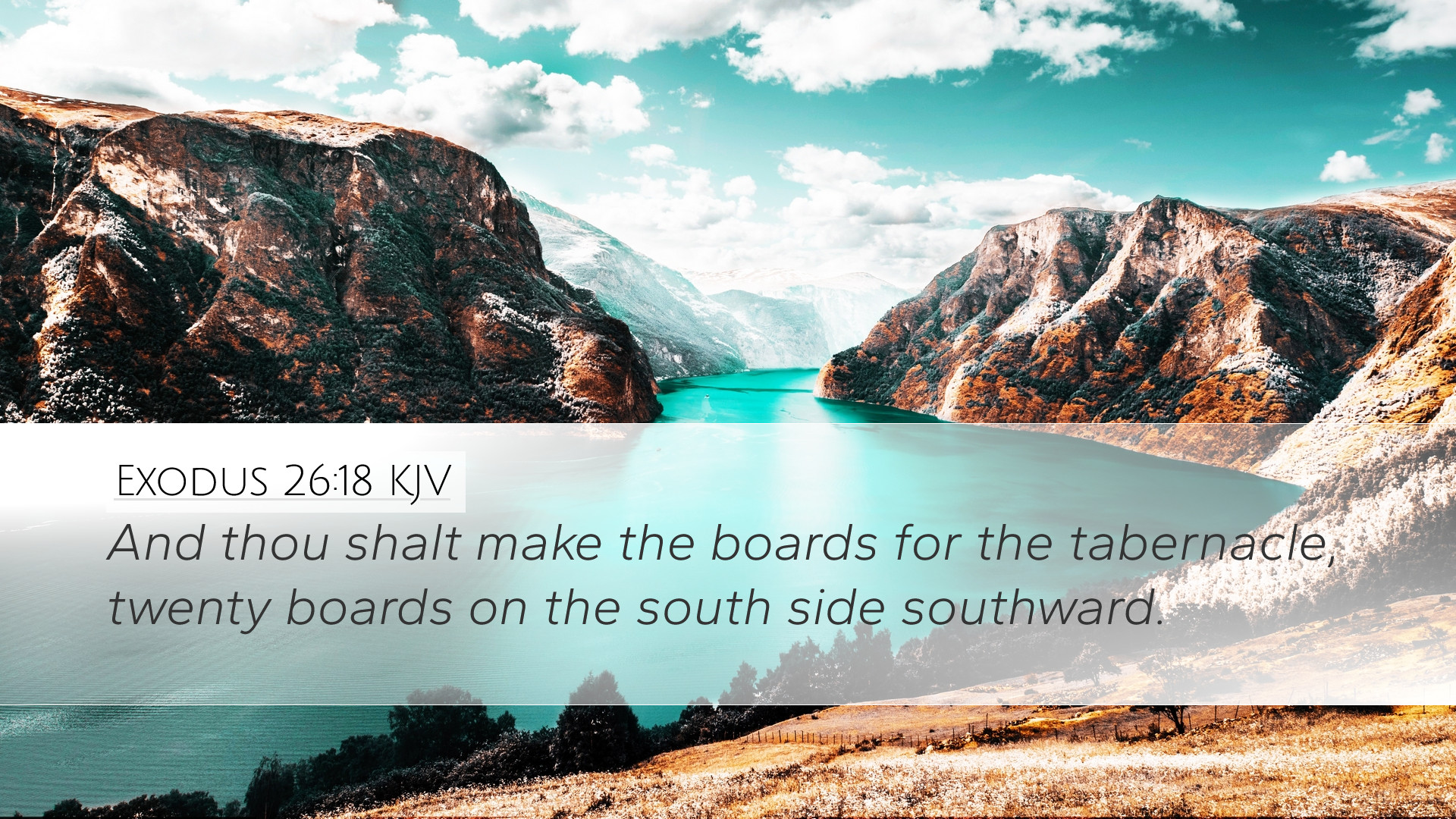Commentary on Exodus 26:18
Exodus 26:18 states: "And you shall make the boards for the tabernacle of acacia wood, standing upright." This verse marks a pivotal moment in the narrative of the Israelites' journey, encapsulating both the physical and spiritual dimensions of their relationship with God.
Contextual Background
The construction of the tabernacle is a significant event during the Israelites' exodus from Egypt, representing God's divine presence among His people. Various public domain commentaries elucidate the importance of this event, emphasizing its theological and symbolic underpinnings.
Matthew Henry's Insights
Matthew Henry notes that the tabernacle is not just a structure but a divine dwelling place. He emphasizes that the materials used, particularly "acacia wood," symbolize the endurance and incorruptibility of Christ, who ultimately fulfills the tabernacle’s purpose as the true manifestation of God's presence.
The Significance of Acacia Wood
The choice of acacia wood, which is known for its durability, suggests the lasting nature of God's covenant with His people. Henry points out that as the boards stood upright, they serve as a metaphor for the uprightness and integrity expected of God's people. This uprightness reflects holiness and sets the standard for the moral character of the Israelites.
Albert Barnes' Commentary
Albert Barnes expands on the construction of the tabernacle, detailing how the boards' upright position represents stability and strength. He interprets this as a reflection of God's unchanging nature and character, emphasizing that just as the boards were made to stand firm, so too should the faith of the Israelites be steadfast.
The Purpose of the Tabernacle
Barnes argues that the purpose of the tabernacle was not merely functional but deeply spiritual. The location of each component reinforces the idea of God dwelling with His people, which is a recurring theme throughout the Scriptures. The tabernacle becomes a model for future worship and signifies God's commitment to being present even in the challenges faced by the Israelites.
Adam Clarke's Analysis
Adam Clarke offers a detailed examination of the construction methods and materials, emphasizing that the specific dimensions and arrangements were divinely ordained. He identifies the boards as representative of the people of Israel, with each board symbolizing an individual member of the community.
The Community Aspect
Clarke highlights the communal aspect of worship in the tabernacle’s design. Each board, while distinct, contributed to the whole, symbolizing the unity and collective strength of Israel as the body of God’s chosen people. This unity is crucial for understanding how believers are called to support one another within the body of Christ today.
Theological Implications
The theological implications of Exodus 26:18 extend beyond the immediate context. The act of erecting the tabernacle with acacia wood boards stands as an early precursor to New Testament themes of Christ as the fulfillment of the law and the living tabernacle, where God’s presence is no longer confined to a physical structure.
Christ as the Fulfillment
Christ is commonly referenced in the context of the tabernacle. The New Testament book of Hebrews (Hebrews 9:11-12) connects Jesus’ sacrificial role to that of the high priest, emphasizing that He entered the holy places not by the blood of goats and calves but by His own blood, shedding light on the eternal significance of the tabernacle.
Practical Applications for Believers
The construction of the tabernacle serves as a model for contemporary worship and community living among believers. The call to uphold integrity and facilitate God’s presence in daily life can transform both personal and communal faith practices. God’s dwelling among His people invites reflection on personal holiness and the imperative of communal support.
- Uprightness in Worship: The upright standing of the boards reminds believers to maintain integrity in worship, reflecting the character of God in their lives.
- Restoration and Unity: Just as the separate boards come together to form one tabernacle, believers today are called to support one another in unity for the sake of the gospel.
- God's Presence: The tabernacle symbolizes God's desire to dwell among His people, a reminder that faith is rooted in a personal relationship with God.
Conclusion
Exodus 26:18 encompasses deep theological truths that resonate through the ages. In examining the construction of the tabernacle, scholars and believers alike are reminded of God's faithfulness, the importance of integrity, and the communal nature of worship. The insights from Matthew Henry, Albert Barnes, and Adam Clarke collectively enrich our understanding of this pivotal verse, inviting reflection and encouraging application within the life of the Church.


